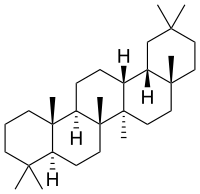Oleanane
 | |
| Names | |
|---|---|
| IUPAC name
Oleanane[1] | |
| Identifiers | |
| 471-67-0 | |
| ChEBI | CHEBI:36481 |
| ChemSpider | 7827640 |
| |
| Jmol-3D images | Image |
| PubChem | 9548717 |
| |
| Properties | |
| Molecular formula |
C30H52 |
| Molar mass | 412.73 g·mol−1 |
| Except where noted otherwise, data is given for materials in their standard state (at 25 °C (77 °F), 100 kPa) | |
| | |
| Infobox references | |
Oleanane is a natural triterpene. It forms the central core for a wide variety of chemical compounds found in flowering plants which are referred to collectively as oleanane triterpenes.
Some oleanane triterpenes have a suppressing effect on insect pests. They are considered a key marker differentiating flowering plants from other life, and have been used in the effort to study their evolution, which is as yet poorly documented in the fossil record.
These compounds appear to have been shared by a group of plants called gigantopterids, which lived twice as long ago as the oldest known flower fossils.[2] They may have been close relatives of the flowering plants, moving the divergence of the flowering plant lineage back to more than 250 million years ago.
Oleanane has also been found in extant ferns, though in those it is suspected of being produced "from a biochemical pathway separate from that found in angiosperms" (via convergent evolution).[3]
References
- ↑ Revised Section F: Natural Products and Related Compounds: Oleanane
- ↑ Miller, John M. (2007): Paleobotany of Angiosperm Origins. Version of 2007-DEC-10. Retrieved 2007-DEC-12.
- ↑ Taylor, David Winship; Li, Hongqi; Dahl, Jeremy; Fago, Fred J.; Zinniker, David; Moldowan, J. Michael (2006). "Biogeochemical evidence for the presence of the angiosperm molecular fossil oleanane in Paleozoic and Mesozoic non-angiospermous fossils". Paleobiology 32 (2): 179. doi:10.1666/0094-8373(2006)32[179:BEFTPO]2.0.CO;2. ISSN 0094-8373.